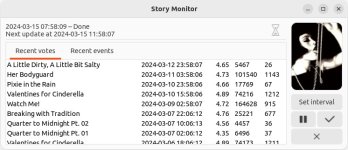joy_of_cooking
Literotica Guru
- Joined
- Aug 3, 2019
- Posts
- 1,167
Hey everyone, I just figured out how to download my story stats without manually clicking the link:
The "..." is specific to your login session. Once you're logged in to the site in a web browser, you can get your auth token by using the network inspector to record the outgoing request when you click the link in your browser. I don't yet know how long-lived this value is.
Bash:
curl https://literotica.com/api/3/submissions/my/stories/published.csv --cookie 'auth_token=...'The "..." is specific to your login session. Once you're logged in to the site in a web browser, you can get your auth token by using the network inspector to record the outgoing request when you click the link in your browser. I don't yet know how long-lived this value is.
